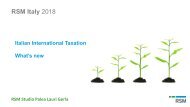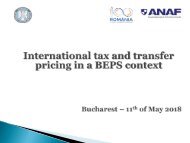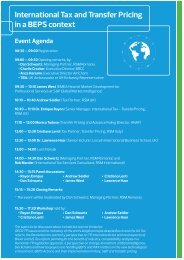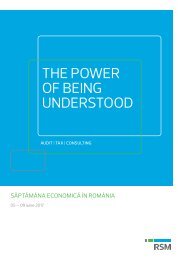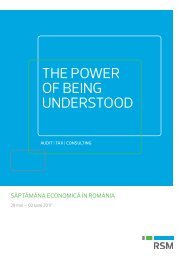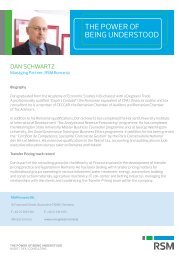You also want an ePaper? Increase the reach of your titles
YUMPU automatically turns print PDFs into web optimized ePapers that Google loves.
THE POWER<br />
OF BEING<br />
UNDERSTOOD<br />
AUDIT | TAX | CONSULTING<br />
THE BUSINESS WEEK IN ROMANIA<br />
28 March-1 April 2016
MACRO:<br />
• “Macroeconomic balances do not justify an accord<br />
with the IMF”<br />
<strong>Romania</strong>’s economic situation, basic economics and<br />
macroeconomic equilibrium do not warrant the signing<br />
of a new accord with the International Monetary<br />
Fund, declared Minister of Public Finances Anca Dragu<br />
on Friday evening: “I believe that at the moment<br />
<strong>Romania</strong>’s economic situation, basic economics and<br />
macroeconomic equilibrium do not warrant the signing<br />
of an accord with the IMF. In any event, a year ago,<br />
the European Commission included <strong>Romania</strong> on its list<br />
of countries with macroeconomic imbalances. On 24<br />
February 2016, the Commission decided that <strong>Romania</strong><br />
no longer has any macroeconomic imbalances.<br />
Therefore, there is no economic situation to justify<br />
the need for an economic and financing agreement<br />
with international financial institutions.” She also drew<br />
attention to the rules of economic governance by<br />
which <strong>Romania</strong> has to abide as a member state of the<br />
European Union.<br />
• The National Bank’s foreign currency reserves<br />
increased by 500 million euros in March<br />
The National Bank of <strong>Romania</strong>’s (BNR) foreign currency<br />
reserves increased by almost 500 million euros in March<br />
(1.48%), reaching 31.28 billion euros, after receipts of<br />
around 1.39 billion euros, entered into the accounts of<br />
the Ministry of Finance and the European Commission<br />
in particular. As of 29 February the reserves stood at<br />
30.825 billion euros. In March, there were receipts of<br />
1.389 billion euros, partly from release of the minimum<br />
foreign currency reserves set up by banks in the BNR<br />
after these were reduced in January from 14% to 12%,<br />
according to a BNR press release.<br />
On the other hand, there were outlays of 932 million<br />
euros, representing modification of the minimum<br />
foreign currency reserves, payment of instalments and<br />
interest on behalf of the public debt denominated in<br />
foreign currency, and others.<br />
The gold reserve remained steady at 103.7 tonnes,<br />
valued at around 3.62 billion euros, given international<br />
price fluctuations. <strong>Romania</strong>’s international reserves<br />
(foreign currency plus gold) stood at 34.9 billion euros<br />
at the end of March, compared with 34.6 billion euros<br />
in February.<br />
• Rate of unemployment at a six-year low<br />
The number of people unemployed decreased in<br />
February of this year by around 7,000, compared with<br />
the previous month, reaching a figure of 597,000, and<br />
the rate of unemployment remained steady at 6.5%,<br />
the lowest level since the middle of 2009. In January,<br />
the number of unemployed in <strong>Romania</strong> fell by 12.000<br />
to 604,000, according to the figures published on<br />
Friday by the National Institute of Statistics. The level<br />
of 6.5%, calculated using the methodology of the<br />
International Office of Labour, had not been recorded<br />
since May-June 2009. The estimated number of people<br />
unemployed (aged 15 to 74) for February of this year<br />
was 597,000, a decrease from the figure of 604,000 for<br />
the preceding month and also compared with the figure<br />
of 626,000 for the same month of the previous year.<br />
Unemployment is higher among men, at 7% in February,<br />
compared with the figure for women, at 5,8%.<br />
• The first concrete measure to reduce bureaucracy<br />
The government has passed an emergency ordinance<br />
that will massively reduce the number of documents<br />
that public institutions of every kind will be able to<br />
demand from taxpayers, according to sources in the<br />
Victoria Palace, cited by Hotnews. The legislation,<br />
inspired by a recent proposal, has a single article:<br />
“Every public entity in <strong>Romania</strong> at the central and local<br />
administrative level, every agency or other institution<br />
with public authority, will not be able to demand from<br />
taxpayers—natural persons, legal entities or nongovernmental<br />
organisations—any document that<br />
has been generated or already exists in any kind of<br />
archive of any kind of public entity. The public entity<br />
that demands any such document is obligated to take<br />
measures to obtain such document directly, without<br />
demanding this from the taxpayers.” The passing of<br />
this emergency ordinance is the first concrete measure<br />
put forward by the so-called “paperwork-cutting<br />
commission”, whose establishment was recently<br />
announced by the Cioloș government.<br />
THE POWER OF BEING UNDERSTOOD<br />
AUDIT | TAX | CONSULTING
MACRO:<br />
• Juridical Commission report on the commissioning<br />
payment law expected on Tuesday, 5 April<br />
The Juridical Commission has decided that the report on<br />
the commissioning payment law should be made public<br />
on Tuesday, 5 April, the decision having been taken<br />
after more than three and a half hours of discussions,<br />
in which the law’s initiators pleaded for sharing the<br />
risk between banks and consumers, while the National<br />
Bank of <strong>Romania</strong> emphasised the dangers of the law.<br />
The Juridical Commission will reconvene on Tuesday,<br />
5 April to draw up the report on the commissioning<br />
payment law, which will then be passed to the Chamber<br />
of Deputies. In the session on Tuesday, the deputies<br />
will decide whether they will increase the ceiling from<br />
150,000 to 250,000 euros and whether they will<br />
eliminate the First Home programme from the proposed<br />
law, as demanded by the National Bank. The president<br />
of the Juridical Commission, Bogdan Ciucă, asked<br />
participants in the debate to come up with concrete<br />
viewpoints, with eventual amendments to be put to<br />
a vote by the Juridical Commission if adopted by<br />
the deputies.<br />
Sources: adevarulfinanciar.ro, Hotnews, news.ro,<br />
profit.ro, zf.ro<br />
BUSINESS<br />
The State will list another five large companies on the<br />
stock exchange<br />
The head of the capital markets supervisory<br />
committee, Mircea Ursache, declared in an interview<br />
for economica.net: “There is a prospect that within<br />
one and a half years the State will extend with<br />
the same success as hitherto the listing of major<br />
<strong>Romania</strong>n companies: Hydroelectrica, Salrom, the Port<br />
of Constanța, and the National Airports Company.<br />
Mircea Ursache, vice-president of the Financial<br />
Supervisory Authority (ASF), who is in charge of capital<br />
markets, stated: “One of the five major successes<br />
of the <strong>Romania</strong>n capital market will be these four<br />
major listings by no later than 2017, which will mean a<br />
very great deal for the <strong>Romania</strong>n capital market, will<br />
contribute to an increase of liquidity in this market, and<br />
will bring numerous foreign investment institutions<br />
onto the <strong>Romania</strong>n market.” The four listings (IPOs)<br />
are Hydroelectrica in November 2016, followed by the<br />
National Salt Company, the Port of Constanța, and the<br />
National Airports Company, in that order.<br />
• UniCredit Bank <strong>Romania</strong> goes from stable to negative<br />
The Fitch rating agency has downgraded UniCredit<br />
Bank <strong>Romania</strong> from “stable” to “negative”. The decision<br />
was taken as a result of the downgrading of the parent<br />
group in Italy to negative and because <strong>Romania</strong>n<br />
operations are of strategic importance for the Italian<br />
group. UniCredit Bank reported a net profit of 222<br />
million lei last year (50 million euros), an increase of<br />
177% compared with 2014, against a backdrop of a<br />
decrease in provisions costs of around a third, to 407<br />
million lei. UniCredit is one of the most important banks<br />
in the local banking system, with a market share of<br />
around eight per cent and occupies fourth place in the<br />
league tables by assets.<br />
• The number of liquidated companies doubled in the<br />
first two months of the year. Companies going out of<br />
business doubled by 52%<br />
The number of companies that went out of business in<br />
the first two months of this year increased by 51.89%,<br />
and the number of companies that were liquidated<br />
increased by 111.77%, compared with the same period of<br />
the previous year, according to data from the National<br />
Office of the Registry of Commerce (ONRC). Bucharest<br />
came in first place for the number of companies going<br />
out of business, at 654, an increase of 64.34%, followed<br />
by Constanța, at 250 (+68.92%) and Bihor, at 207<br />
(+71.07%), according to ONRC data. Likewise, 6,603<br />
companies were liquidated in January and February,<br />
111.77% more than in the same period of 2015. The<br />
number of companies going into insolvency fell in the<br />
first two months of the year by 23.43% compared with<br />
the same period of the previous year, decreasing to<br />
1,451 units. The greatest number of cases was in the<br />
Municipality of Bucharest, at 320, a decrease of 22.14%,<br />
followed by Jassy, at 103, a decrease of 0.96%, and<br />
Bihor, at 96, a decrease of 2%. The economic sector<br />
hardest hit was retail and wholesale, motor vehicle and<br />
motorcycle repairs, with 466 cases, 28% less than in<br />
January and February 2015.<br />
THE POWER OF BEING UNDERSTOOD<br />
AUDIT | TAX | CONSULTING
BUSINESS<br />
• Rompetrol moves ever closer to becoming Chinese<br />
The Kazakhs and Chinese are coming closer and<br />
closer to reaching an agreement on what might be the<br />
transaction of 2016, with <strong>Romania</strong>’s biggest refinery<br />
at stake: Petromidia, the only refinery with a strategic<br />
position on the Black Sea. According to the information<br />
available, the value of the transaction could exceed five<br />
hundred million dollars. “For some time the information<br />
has been that the two parties are on the final stretch<br />
as regards an agreement. The managers here have had<br />
repeated talks with the Chinese party, and so there<br />
are signs,” said market sources. “There are few doubts<br />
as to the transaction taking place, especially given<br />
Kazakhstan’s situation, but it remains to be seen when<br />
a final agreement will be reached between the two<br />
parties,” added sources in the field.<br />
• Investments in oil and gas exploration and production<br />
triple within the <strong>Romania</strong>n economy<br />
A one-billion-euro average investment in oil and natural<br />
gas exploration and production generates an additional<br />
2.3 billion euros for the <strong>Romania</strong>n economy, through<br />
direct added value and the activities of companies<br />
in the sector, and also thanks to the fact that their<br />
efficiency has vertically and horizontally engaged<br />
a large number of suppliers and business partners,<br />
indicates a study carried out by consultancy firm KPMG<br />
at the request of petroleum association ROPEPCA.<br />
The investment of one billion euro also has a knockon<br />
effect on the rest of the economy, with additional<br />
gains of 0.9 billion euros, which raises to 3.2 billion euros<br />
the total impact that the oil and gas exploration and<br />
production industry has on GDP. The one-billion-euro<br />
investment taken as a sample in the study maintains<br />
almost 26,000 direct jobs in the sector. An additional<br />
20,000 jobs are created or maintained in other sectors<br />
of the <strong>Romania</strong>n economy. KPMG set the estimated<br />
total impact at 45,900 jobs linked directly and indirectly<br />
to the industry.<br />
Sources: adevarulfinanciar.ro, Capital, economica.net,<br />
Hotnews, Mediafax.ro, profit,ro, ZF.ro<br />
THE POWER OF BEING UNDERSTOOD<br />
AUDIT | TAX | CONSULTING






